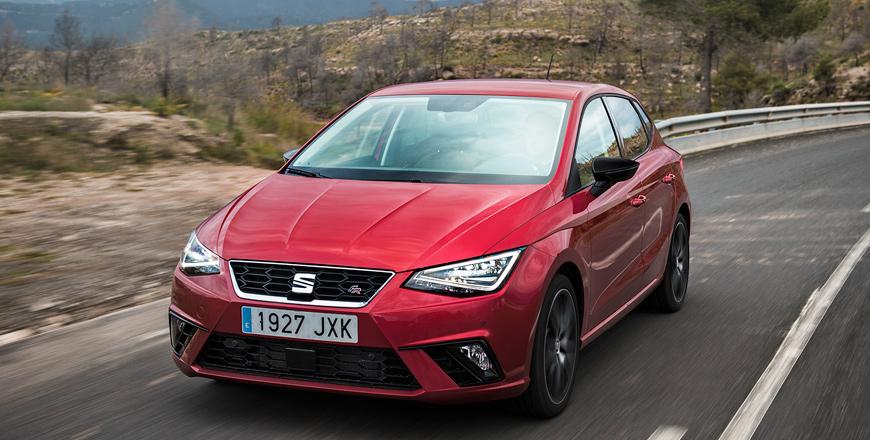- International News
- Tue-2021-06-15 | 06:17 pm

Nayrouz News Agency :
First launched in 1984 when Seat was an independent Spanish automaker, the inaugural generation Ibiza borrowed somewhat from Italian and German knowhow. Utilising a Fiat Ritmo platform and Giorgetto Giugiaro design, most first generation Ibiza engines were developed in collaboration with Porsche, and it was readied for production by Karmann. With Seat entering the German industrial fold proper upon acquisition by Volkswagen in 1986, subsequent Ibizas since 1993 — including the current and fifth generation — have become Iberian incarnations of Volkswagen’s Polo B-segment supermini.
Dramatic design
A youthfully sporty and more affordable wing of Volkswagen, Seat’s identity and position within the organisation seemed to temporarily lose focus and purpose as Czech manufacturer Skoda came under the German automotive empire’s umbrella during the early 1990s, as another accessibly priced Volkswagen product. Revitalised with exciting hot hatches like the Leon Cupra and contemporarily relevant crossovers like the Ateca more recently, Seat’s mainstay Ibiza model has meanwhile gained a fresh, sharp and distinctly purposeful design, and has never looked better since the Italdesign-penned original.
Introduced in 2017, the latest generation Ibiza is palpably sportier in its demeanour than its three immediate predecessors. Athletic in its stance and taut design lines, the current Ibiza’s intricate use of sharp creases and character lines is visceral and uncomplicated in evoking a sense of urgency. Seemingly lower and wider, with broader fascia and shorter front overhang, the current Ibiza features an assertive headlight signature, big gaping lower intake, sculpted surfacing, defined sills and a level waistline trailing off to a rear window-line kink.
Responsive and efficient
At its best aesthetically in sportier FR specification with bigger 17-inch alloy wheels and dual integrated exhaust port elements, European market Ibizas are available with a selection of small displacement naturally-aspirated and turbocharged direct injection 3- and 4-cylinder petrol and diesel engines, in various states of tune. For some developing markets, Volkswagen’s thoroughly proven and less complicated naturally-aspirated multi-point injection 1.6-litre 4-cylinder engine is employed. Developing 109BHP at 5,800rpm and 114lb/ft torque at 3,800-4,000rpm, it drives the front wheels through an optional 6-speed automatic gearbox.
Refined in operation and progressive in how it builds torque and power, the Ibiza’s 1.6-litre engine may not quite make it a hot hatch, but with well-judged gear ratios and a lightweight estimated at around 1,150kg, it is responsive from low-end, versatile on the move and willing towards its top-end. Confident in terms of performance, the Ibiza is capable of a top speed of 192km/h and is fairly quick through 0-100km/h in 10.8-seconds. Meanwhile, frugal combined cycle fuel efficiency is quoted at 6l/100km.
Confident yet perky
Built on the same small MQB A0 version of the Volkswagen group’s versatile modular platform, the Ibiza shares its basic architecture with the Volkswagen Polo, Audi A1 and Skoda Scala, including MacPherson strut front and torsion beam rear suspension, and electric-assisted rack and pinion steering. Stable, settled and refined on the highway, the Ibiza is mature and reassuringly composed in its class. However, it is nevertheless agile, engaging and fun through twisty roads, and is manoeuvrable, easy to park and place on the road in town.
Perky and playful if driven hard through narrow winding roads, the nippy Ibiza is ever responsive to direction changes. Turning in tidily with understeer kept well at bay, the Ibiza’s steering is quick and direct, with enough steering feel and feedback to keep it engaging rather than clinical. Well controlling body lean, the Ibiza delivers good road-holding, but is nevertheless adjustable when asked to shift weight and tighten a cornering line. Meanwhile, ventilated front and solid rear disc brakes deliver confidently responsive stopping power.
Composed and classy
Smooth and comfortable in most circumstances, if slightly firm over especially jagged lumps, bumps and cracks with its optional low profile 215/45R17 tyres, the Ibiza otherwise dispatches imperfections with composed confidence, and is settled in its vertical control. A refined compact car with good noise, vibration and harshness isolation, the Ibiza’s cabin meanwhile provides an alert, supportive and comfortable driving position and decent visibility for easy manoeuvrability. Front space comfortably accommodates taller and larger occupants and rear space is decent for its segment and size.
Sporty in ambiance, the Ibiza’s cabin features a chunky steering wheel and clean, user-friendly layouts, instrumentation and controls within easy reach and a slight driver-biased orientation. Classy and sporty inside, the Ibiza uses good materials and build quality in its class, and features piano black style trim accents for a more sophisticated look. Standard and optional safety, convenience and infotainment equipment is meanwhile generous, and minimum luggage volume is good for a supermini at 355-litres, but can be expanded with the rear seats folded down.
TECHNICAL SPECIFICATIONS
Engine: 1.6-litre, transverse 4-cylinders
Bore x stroke: 76.5 x 86.9mm
Compression ratio: 10.5:1
Valve-train: 16-valve, DOHC
Gearbox: 6-speed automatic, front-wheel-drive
Power, BHP (PS) [kW]: 109 (110) [81] @5,800rpm
Specific power: 68.2BHP/litre
Torque, lb/ft (Nm): 114 (155) @3,800-4,000rpm
Specific torque: 97Nm/litre
0-100km/h: 10.8-seconds
Top speed: 192km/h
Fuel consumption, combined: 6-litres/100km
CO2 emissions, combined: 153g/km
Fuel capacity: 40-litres
Length: 4,059mm
Width: 1,780mm
Height: 1,444mm
Wheelbase: 2,564mm
Track, F/R: 1,525/1,505mm
Overhang, F/R: 796/699mm
Headroom, F/R: 1,022/957mm
Shoulder width, F/R: 1,425/1,403mm
Luggage volume, minimum: 355-litres
Kerb weight: 1,150kg (estimate)
Steering: Electric-assisted rack & pinion
Turning Circle: 10.6-metres
Suspension: MacPherson struts/torsion beam
Brakes, F/R: Ventilated discs/discs
Tyres: 215/45R17













